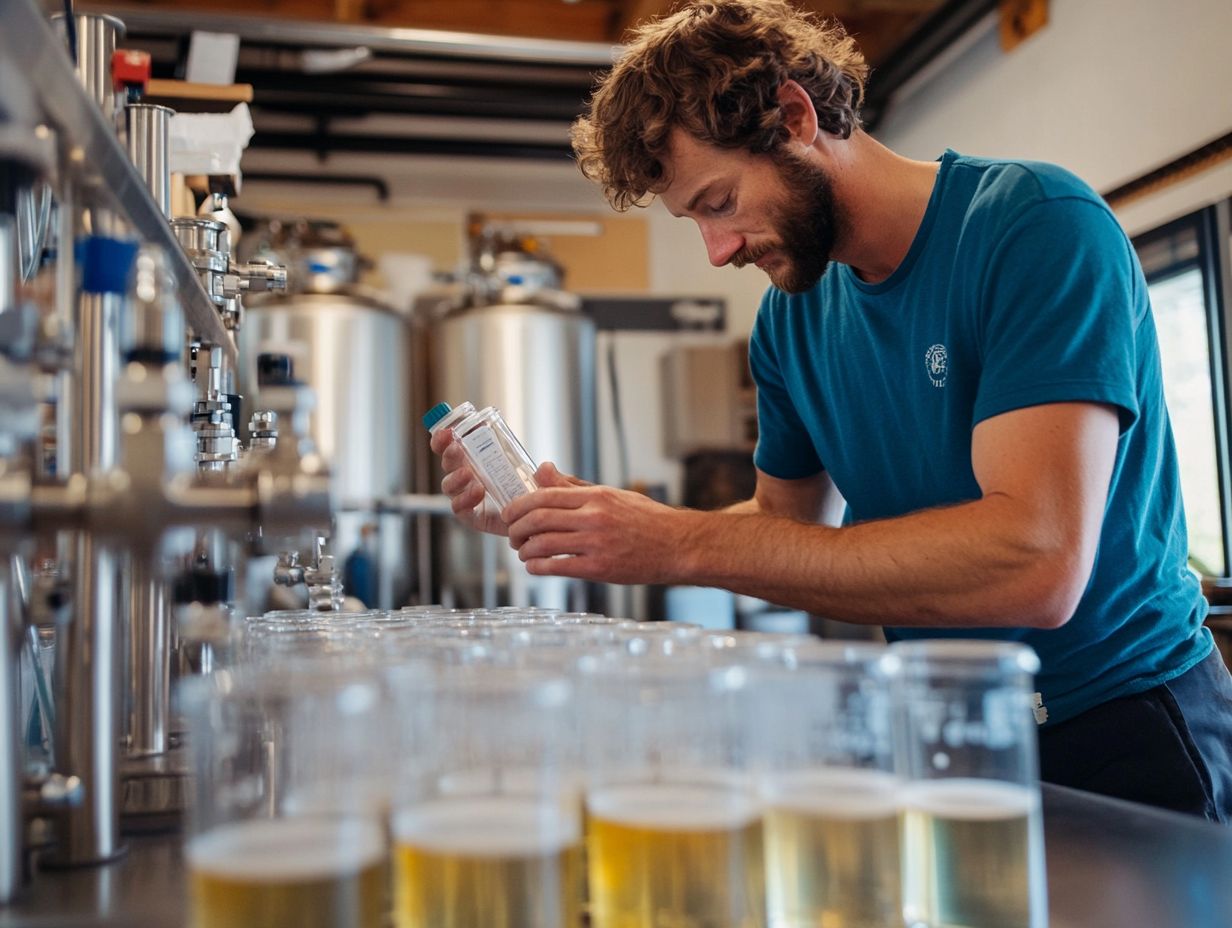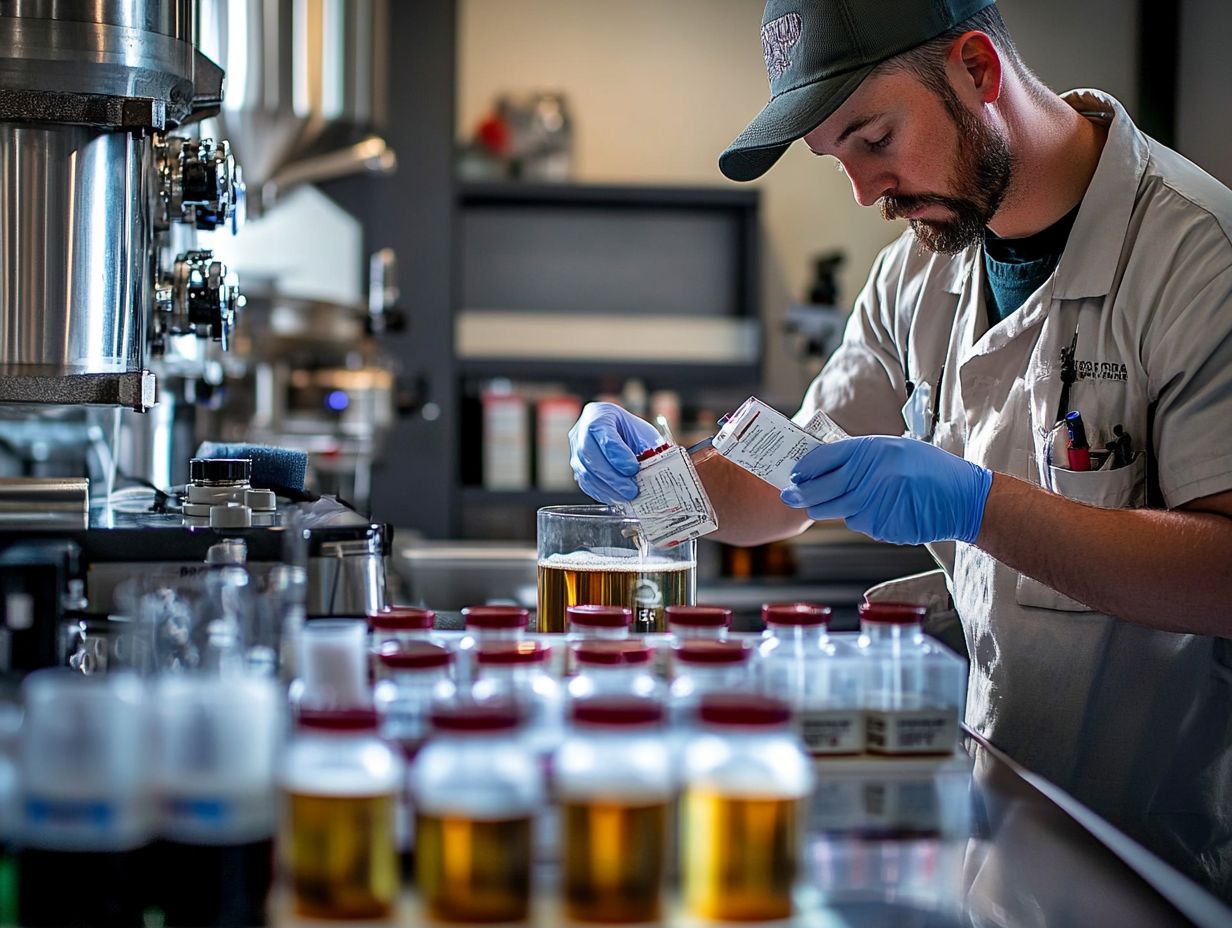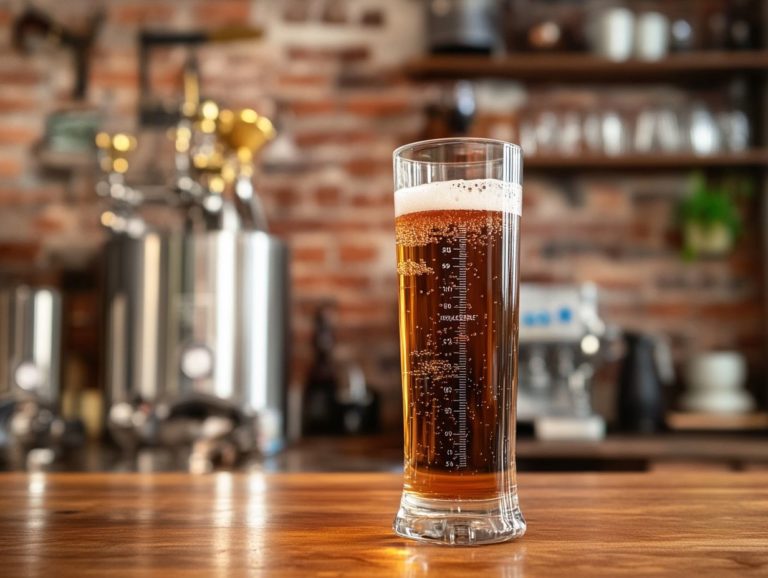How to Adjust for Water Chemistry in Brewing
Contents
- The Importance of Brewing Water
- Key Takeaways:
- Why is Water Chemistry Important in Brewing?
- Understanding Water Profiles and Their Impact on Brewing
- How Do Different Water Profiles Affect the Taste of Beer?
- Adjusting Water Chemistry for Different Beer Styles
- Methods for Adjusting Water Chemistry
- Tips for Maintaining Consistent Water Chemistry
- Why is Understanding and Adjusting Water Chemistry Important for Brewing Quality Beer?
- Frequently Asked Questions
- Introduction
The Importance of Brewing Water
Brewing water is an essential yet frequently underestimated ingredient in the brewing process. It plays a pivotal role in shaping the flavor, aroma, and overall quality of your beer.
This article delves into the intricate relationship between water chemistry and brewing, illustrating how different water profiles can elevate various beer styles. Whether you’re crafting light and refreshing lagers or bold and hearty stouts, grasping the significance of water quality and brewing techniques is vital for any brewer aspiring to achieve consistency and excellence.
Uncover methods for adjusting your water chemistry and explore tips for maintaining the optimal balance. This ensures that your brews truly stand out in both taste and character. Utilizing brewing software and brewing calculators can greatly aid in making precise brewing water adjustments.
Explore various brewing applications and methods for chloramine removal while understanding brewing ratios and water parameters that impact beer quality.
- Dive into water profiles to unlock the secret to brewing consistent, high-quality beer!
- Adjusting water chemistry for different beer styles can enhance or detract from the taste of the finished product, especially with accurate pH measurement and the use of brewing salts.
- Monitoring and controlling water chemistry with a high-quality meter is essential for maintaining consistency and producing the best possible beer.
- Using a home test kit for water testing can ensure accurate readings.
Key Takeaways:

What Role Does Water Play in the Brewing Process?
Water serves as the unsung hero in the brewing process, greatly affecting the quality of the beer you produce. As the primary ingredient, it makes up over 90% of the final product, and its unique mineral profile can dramatically affect everything from fermentation to flavor development.
Homebrewers often rely on water reports to understand their brewing water source and make necessary adjustments. By grasping the importance of brewing water, you can craft balanced beer styles that showcase the malt’s richness, the hops’ bitterness, and the yeast’s vitality.
Careful selection of your brewing water can help you achieve the ideal pH levels and flavor profiles that elevate your brews. Utilizing brewing equipment such as digital pH meters and brewing software can greatly aid in this process.
The specific characteristics of your water, such as pH and mineral content, play a pivotal role in enzyme activity during mashing, which is crucial for breaking down sugars. Maintaining a pH range between 5.2 and 5.6 is key for efficient starch conversion, directly impacting the fermentable sugars available for yeast to work their magic.
Water alkalinity should also be monitored to achieve the desired pH range. Minerals like calcium, magnesium, and sulfate shape the mouthfeel and body of your beer. They can amplify hop flavors or malt sweetness, depending on their concentrations.
Including brewing minerals such as gypsum and Epsom salts can help achieve the perfect balance for your beer styles. With precise manipulation of these elements, you can create a diverse spectrum of beer styles, from crisp lagers to decadent stouts.
This allows you to explore a rich array of flavors and textures in your craft, ensuring that each brew is a unique expression of your artistry. For home brewing enthusiasts, understanding these nuances can elevate your craft beer to new heights.
Why is Water Chemistry Important in Brewing?
Water chemistry plays a pivotal role in brewing, as it directly influences the taste, clarity, and overall quality of your beer. The balance of minerals like calcium, magnesium, sodium, and chloride can either enhance or undermine the flavors you aim to achieve. For example, calcium chloride can add sweetness. Meanwhile, magnesium sulfate can enhance hop bitterness.
Therefore, it s essential to familiarize yourself with your water source whether it s municipal or well water. Make any necessary adjustments to reach optimal results. Employing precise water treatment methods, including brewing salts, reverse osmosis, and distilled water, allows you to fine-tune your brewing water for specific beer styles.
Understanding these chemical components is essential for creating a diverse range of styles, from refreshing pilsners to rich stouts. Each style benefits from tailored water profiles. You can utilize water testing kits to accurately analyze your water chemistry and pinpoint which minerals need adjustment.
Armed with this knowledge, you re ready to create beers that wow your friends and family! By integrating brewing software, you can simulate potential changes and predict their effects on flavor, ensuring that each batch aligns with your vision.
Understanding Water Profiles and Their Impact on Brewing
Understanding water profiles is crucial for any brewer looking to craft specific beer styles. The quality of water plays a significant role in both the brewing process and the resulting flavor and aroma of the beer.
Each region boasts its own unique water composition. This is characterized by varying concentrations of minerals such as calcium, magnesium, sodium, and sulfate. These components can enhance particular characteristics of the beer. For example, a high sulfate level might intensify the bitterness of hops. In contrast, a well-balanced mineral profile can beautifully support malt flavors.
This knowledge enables brewers to refine their recipes precisely according to the beer style they wish to create.
What are the Different Types of Water Profiles?
You ll find that different water profiles play a significant role in the brewing process, with each imparting its unique influence on the resulting flavor profile of your beer. Take municipal water, for instance; it often requires treatment due to elevated levels of chlorine or chloramines that can interfere with your brew.
Then there s distilled water, which is stripped of minerals and might need a dash of brewing salts to boost its flavor. On the other hand, if you re lucky enough to have access to natural mineral-rich water sources, such as springs, you re in for a treat. These waters come with a balanced mineral content that s ideal for crafting a variety of beer styles. Using reverse osmosis which removes unwanted impurities can also help in refining your brewing water source.
Consider the water profile of Colorado, especially around The Front Range. It s celebrated for its diverse mineral content, which shifts depending on elevation and source. You ll notice that the elevated minerals found in Colorado s pristine mountain springs can lead to crisp, clean lagers. Meanwhile, the softer, low-mineral waters in other areas are perfect for brewing those hazy IPAs you love.
Access to detailed water reports can help brewers in Colorado make better brewing water adjustments to match the specific beer styles they aim to create. Brewers in these regions can fine-tune their water by adding gypsum or calcium chloride to enhance hop character or malt sweetness. This makes the final product a tailored masterpiece that caters to specific styles and consumer preferences.
Techniques such as using sodium bicarbonate or Epsom salt can also be used to make precise adjustments. Don t wait! Dive into the world of water chemistry today and revolutionize your brewing skills!
How Do Different Water Profiles Affect the Taste of Beer?
Different water profiles can dramatically influence the taste of your beer, affecting aspects like bitterness, sweetness, and mouthfeel. If you use water with a high sulfate ratio, it can amplify the bitter taste of hops, making it perfect for hoppy styles like IPAs.
Conversely, higher chloride levels can elevate malt flavors, which is often preferred for stouts and porters. Employing techniques like using potassium metabisulphite for chloramine removal can also improve your brewing water’s suitability for beer production.
Don’t overlook the pH measurement of your water, as it plays a crucial role in enzyme activity during mashing. This impacts the final flavor and quality of your brew. Using a digital pH meter ensures precise pH levels.
As you embark on your brewing journey, you might find yourself experimenting with various minerals like calcium, magnesium, and bicarbonate, a mineral that can affect water’s alkalinity, to perfect your creations.
If you’re a homebrewer striving to capture the crispness of a West Coast IPA, adding gypsum to your water can enhance that hop character beautifully. On the flip side, if you re aiming for a rich, malty amber ale, incorporating Epsom salts can help round out those flavors.
Homebrewing techniques and utilizing water filtration systems can also aid in achieving the desired water composition for your specific brewing needs. By grasping the intricate relationship between these elements, you ll craft beers that mirror traditional styles while showcasing your unique taste!
Using brewing recipes tailored to specific water profiles further enhances your craft beer.
Adjusting Water Chemistry for Different Beer Styles

Adjusting water chemistry is essential for those who aspire to craft unique flavors and characteristics that cater to specific beer styles. Each beer style has its optimal water profile, which significantly impacts the brewing process.
For example, light beers thrive on soft water with low mineral content. In contrast, dark beers benefit from higher mineral levels that amplify their rich flavors.
By grasping and implementing the necessary brewing adjustments through various brewing salts, you can successfully attain the desired results. Techniques such as reverse osmosis help in adjusting water alkalinity, making it ideal for specific beer styles.
What Water Chemistry is Ideal for Light Beers?
The ideal water chemistry for brewing light beers involves maintaining low mineral content and a well-balanced ratio of chloride to sulfate levels. Use soft water with lower hardness to bring out those delicate malt flavors while ensuring a crisp finish.
Utilizing brewing software and brewing calculators can help in making precise brewing water adjustments. If necessary, you can make adjustments with brewing salts like calcium chloride.
This mineral enhances mouthfeel and sweetness without overshadowing the subtle nuances that define light beer styles.
Adding just a touch of gypsum can elevate the sulfate level slightly, introducing a more pronounced hop bitterness that works wonders in certain light styles, such as a hoppy lager.
It’s also essential to consider your water source and regularly monitor its quality. Using home test kits allows you to accurately assess mineral content and pH levels.
By consistently testing your water, you can make the necessary adjustments to achieve a reliable flavor profile. This diligence ensures that each batch of light beer delivers that refreshingly vibrant taste, free from any undesirable off-flavors.
What Water Chemistry is Ideal for Dark Beers?
Dark beers flourish in water chemistry characterized by a higher mineral content, which amplifies their rich, roasted flavors and fuller mouthfeel. When certain minerals, such as magnesium sulfate and calcium, are present, they enhance the maltiness while balancing the bitterness from hop additions.
You can make adjustments by incorporating brewing salts like gypsum or Epsom salt to achieve a mineral profile that enhances these flavors and maintains the ideal pH level for fermentation.
To tailor your water profile effectively, begin by assessing the existing mineral composition of your water source. Adding salts such as calcium chloride can elevate the sweetness and roundness of dark beers while also aiding in clarifying the final product. It’s crucial to keep an eye on the sulfate-to-chloride ratio. A higher sulfate concentration boosts hop bitterness, which is essential for hoppy beers.
Using methods like reverse osmosis allows you to dilute unwanted minerals, giving you the flexibility to craft the perfect mineral content for your specific recipe. Don t hesitate experimenting with these elements can dramatically transform the finishing touch of your dark brew, enhancing the overall experience for those who savor your creations.
What Water Chemistry is Ideal for Hoppy Beers?
In terms of hoppy beers, the key to success lies in achieving the perfect water chemistry, particularly by emphasizing a higher sulfate ratio. This enhancement elevates hop bitterness and aroma, resulting in a profile that is both pronounced and refreshingly vibrant.
Sourcing mineral-rich water is essential, as it can dramatically enhance the character of your IPAs and pale ales. By thoughtfully adjusting your brewing water with salts like gypsum, you can achieve the ideal intensity of bitterness and the floral hop notes that define your final product.
To refine your brewing process even further, it s important to keep a close eye on sulfate levels, ideally aiming for a range between 200 and 400 ppm. This target range tends to bring out the best in hop-forward recipes. Take, for example, a classic West Coast IPA; this beer truly thrives on such adjustments, where a delicate balance of bisulfate can amplify its crispness.
Incorporating techniques like whirlpool hopping into your brewing process maximizes the hop impact, allowing the carefully adjusted water chemistry to ensure the characteristic resinous and citrusy flavors truly shine. Don’t shy away from experimenting with different sulfate levels doing so can lead to distinctive results and underscores the vital role that water quality plays in crafting exceptional hoppy brews.
Methods for Adjusting Water Chemistry
You have many methods at your disposal to adjust water chemistry, allowing you to optimize your brewing process and elevate the quality of your beer. These techniques range from incorporating various brewing salts to utilizing better water filters.
Conducting thorough water testing is essential for understanding the existing mineral content and pH levels, setting the foundation for informed adjustments. Investing in high-quality brewing equipment, like accurate pH meters, significantly enhances your ability to make precise modifications, ensuring that you achieve the perfect flavor profile in every batch.
What Are the Different Ways to Adjust Water Chemistry?
Adjusting your water chemistry can be accomplished through several effective methods, such as adding brewing salts, employing water treatment processes, and utilizing brewing software to analyze your mineral content.
By grasping the significance of each mineral, you can craft a tailored profile that complements your desired flavor outcomes. For instance, introducing gypsum can amplify hop bitterness in pale ales, while calcium chloride may be more suitable for enhancing the malt character in stouts.
In terms of putting these adjustments into action, it’s essential to measure your ingredients precisely and incorporate them during the brewing process, ideally in the mash or sparge water. Brewing software is invaluable in this regard, offering detailed analyses of your water chemistry and guiding you in making informed decisions about necessary adjustments.
This diligent approach ensures that each batch of your brew achieves the flavor profile you envision.
What Are the Pros and Cons of Each Method?

Each method of adjusting water chemistry comes with its own set of advantages and disadvantages that you should weigh carefully to achieve optimal results in your brewing process.
For example, using brewing salts is a straightforward way to enhance flavor, but it requires precise measurement and a solid grasp of your water profile to avoid inadvertently altering the composition too much. On the flip side, water treatment methods like reverse osmosis can deliver highly purified water, but they might strip away essential minerals, meaning you’ll need to make additional adjustments to restore that all-important balance.
Carbon filtration systems can effectively reduce chlorine and other unwanted impurities, giving your brew a cleaner taste. However, relying solely on these systems may not yield the mineral content necessary for specific beer styles.
Another approach is to blend different water sources, which allows you to tailor the final composition to suit your desired brew, but this requires a keen understanding of the profile of each source.
Ultimately, the best method for you will depend on your specific brewing goals whether you’re aiming for crisp lagers or rich stouts. By understanding the unique interactions between water chemistry and your ingredients, you’ll be well-equipped to make informed choices that elevate your brewing game.
Tips for Maintaining Consistent Water Chemistry
Maintaining consistent water chemistry is essential for any brewer striving to craft high-quality beer with predictable flavors and characteristics. Regular water testing, whether through home test kits or digital pH meters, allows you to closely monitor your water quality and make the necessary adjustments before each brewing session.
By incorporating effective brewing techniques and utilizing the right equipment, you can further enhance the reliability of your water chemistry, ensuring that every batch aligns with your desired standards.
How Can You Monitor and Control Water Chemistry?
Monitoring and controlling water chemistry requires a systematic approach where you measure key water parameters and make informed adjustments based on your test results. You can employ home test kits to analyze pH levels, mineral content, and overall water quality, ensuring that your brewing water aligns perfectly with the desired profile for specific beer styles.
By utilizing brewing equipment with high-quality meters, you can enhance precision in water chemistry control throughout your brewing process.
Regular testing is not just a good idea; it’s essential. It allows you to spot any fluctuations in water quality that could affect your final product. You have access to various tools, such as digital titration kits and ion-selective electrodes, which provide accurate readings of crucial minerals like calcium, magnesium, and bicarbonate.
Understanding these results is vital; for instance, while higher levels of certain minerals can enhance flavor depth, they may also need to be balanced for optimal brewing performance.
Best practices include maintaining a consistent testing schedule and keeping detailed records of your results and adjustments. This diligence ensures that your water quality remains ideal as you brew different batches, elevating your brewing game to new heights.
What Factors Can Affect Water Chemistry?
Several factors can significantly influence water chemistry, shaping both the quality and flavor of the beer you produce during the brewing process. The source of your water whether municipal or well water plays a crucial role, as it may harbor varying levels of minerals, contaminants, and treatment chemicals like chloramines or chlorine.
Temperature and storage conditions can also alter the water’s composition, impacting the effectiveness of brewing salts and other adjustments you make.
Understanding these nuances is vital for you as a brewer aiming to achieve a specific flavor profile in your beer. For instance, excessive sodium can impart a salty taste, while elevated sulfate levels can amplify hop bitterness, leading to an imbalanced flavor experience.
By proactively addressing these issues through effective water treatment methods such as employing activated carbon filtration to eliminate chlorine compounds or utilizing reverse osmosis to remove unwanted minerals you can take control of the brewing process.
Selecting the right brewing salts, like gypsum or calcium chloride, allows you to fine-tune the mineral content, enhancing the desired characteristics of your final product. By carefully managing these elements, you can significantly elevate the overall quality of your beer.
Why is Understanding and Adjusting Water Chemistry Important for Brewing Quality Beer?
Understanding and adjusting water chemistry is crucial for you as a brewer striving to produce exceptional beer. The right balance of minerals can significantly enhance specific characteristics across various beer styles.
By mastering water treatment techniques and knowing how to make precise adjustments with brewing salts, you can manipulate flavor profiles, achieve the pH levels you desire through pH measurement, and create a well-balanced final product.
Paying close attention to water quality, including water composition and water parameters, not only influences the brewing process but also shapes the overall drinking experience for your consumers.
For example, if you re crafting a hoppy IPA, you might consider adding sulfate to the water to elevate the beer’s aromatic qualities, accentuating hop bitterness and highlighting those vibrant hop flavors. On the flip side, when aiming for a malt-forward style like a stout, introducing chloride can help you achieve a rounder mouthfeel and a touch of sweetness.
For more precise adjustments, using brewing software can be beneficial. These targeted modifications underscore just how critical water chemistry is not only in elevating the flavor and aroma of individual brews but also in influencing the larger craft beer landscape, where uniqueness and quality are paramount among producers. Understanding the mineral profile and water alkalinity can greatly assist in these endeavors.
Ultimately, by prioritizing water treatment and incorporating brewing techniques, you can create not just standout beers but also cultivate a deeper consumer interest and appreciation for your craft. This includes the use of a brewing calculator to precisely measure brewing salts like calcium chloride and magnesium sulfate.
Frequently Asked Questions
What is water chemistry and why is it important in brewing?

Water chemistry refers to the composition of minerals and chemical compounds present in water. These elements can greatly affect the taste, color, and overall quality of beer flavor, making it a crucial factor in the brewing process.
How do I test the water chemistry for brewing?
The most common method is through a water analysis kit, or a home test kit, which measures the levels of various minerals and compounds in your water. You can also send a sample to a lab for a more detailed analysis or obtain a water report from your municipal water provider.
What are some common water chemistry adjustments for brewing, and how does one use brewing minerals effectively?
Adjustments can include adding or removing minerals such as calcium, magnesium, and sodium to achieve the desired pH level and water hardness for the specific beer style being brewed. Common brewing salts used are gypsum, Epsom salt, and sodium bicarbonate, among others. These adjustments help enhance specific beer styles and contribute to flavor.
Introduction
What is Water Hardness and Why Does It Matter in Brewing?
Water hardness refers to the concentration of minerals, mainly calcium and magnesium, in water. These minerals affect the taste and clarity of beer and the efficiency of the brewing process, including yeast health.
How Do I Adjust the Water Chemistry for a Specific Beer Style?
Different beer styles require unique water profiles to achieve the desired flavor. Research the recommended water chemistry for your beer style and adjust your water accordingly.
Brewing software helps you manage these adjustments accurately.
Can I Use Tap Water for Brewing? How Do I Know If It’s Suitable for Homebrewing?
Tap water can be used for brewing, but testing the water chemistry first is crucial. Some tap water may have suitable mineral levels, while others may need adjustments.
If necessary, use distilled water or reverse osmosis water as a base and add minerals to achieve the desired profile.






